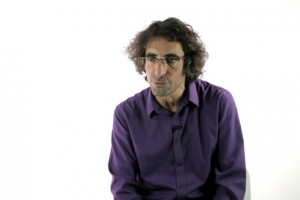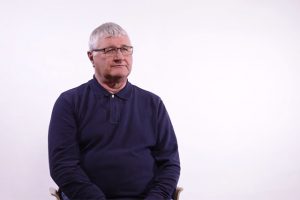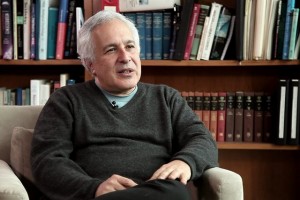Decision Theory under Uncertainty
Economist Itzhak Gilboa on the history of probability theories, predicting the behavior of people, and the lin...
I think when we talk about humanities, there’s always this debate about what you are better off doing if we talk about what you are going to do when you grow up and what kind of diploma you are going to have. The hard sciences were always something where you could have one of those labels: biologist, physicist, chemist. The image pops up: the white lab coat, the laboratory conditions, the face mask, the goggles, all these types of things. The association is quite clear, and then that association would lead to the idea that since we know what they are, based upon their profession, then they’re going to find a job and they’re going to be successful and so forth and so on.
Humanities, on the other side, always had this sort of reputation as being those people who could not do the hard sciences or the programming or whatever you want to call it: those more technically based jobs. One of the things that I think humanities does do in a way and it doesn’t shelter the students from, it exposes them to a human element which the technical side sort of ignores. I’m not saying it’s on purpose, I’m not making a judgment value here: when you’re an engineer, you’re working with engineering, it’s very cut and dry, and it’s very simple, and that’s the way it goes. But when you’re going into humanities, you’re dealing with people, the human element, and I think this is important for our guys because they’re coming out of a period where they’ve been in high school.
High school is about regurgitating information: I’m going to read you a book, you’re going to do the exercises, you’re going to tell me if you knew it and how well you understand the material. That’s fine, but that doesn’t give anyone a sense of life experience. When I look at my students, and I compare myself to them, I’ve got 30 years on them in terms of experience, and even if we’re successful in giving them the skills that they’re going to need to compete on the world markets or wherever they go (maybe it’s in the local market here in Tyumen, it doesn’t really matter) the experience is what allows them to employ those tools that we give them in an appropriate way. How do you know to do that? By making mistakes, and that’s life experience.
So I think that’s where the humanities has a large advantage over, let’s say, a purely hardcore technical education.
The ideal would be that you’d graduate someone with those sorts of human skills that are familiarity with the human element, but still be able to understand the implications of technological development.
How can you actually develop something in a computer program and then understand the way it’s going to influence human behaviour or how humans interact with that technology? So I think that would be the ideal case, but humanities are about learning about people, and that’s something that’s quite important when a situation is now where people don’t seem to understand one another very well, or they’re talking from very very polarized positions, whatever the case may be: politics, economics, whatever culturally.
I think from a historical perspective, it’s even more important now because, let’s say, when I was growing up, we still had the Cold War going on, the world was divided into three parts: you had the Western component, you had the Eastern component, each of them had a particular ideology which legitimized their system. If you look after the collapse of the Cold War, that legitimacy, how do you legitimize the system anymore, how do you legitimize why you believe in one thing versus another, how do you define fundamental concepts, like what is Russian culture, what is American culture, what is culture in general – all of that without this sort of red thread has become very difficult to interpret. We don’t have the music to sing from anymore. So everyone is finding their own way to define what their reality is, and when you have that humanities background, I think it becomes easier to make sense out of the mosaic that you’re faced with.
That is applicable to not just the cultural side, not just the political side, but also the economic side. I say that because when I was hired to go from university into the corporate energy sector, the first thing my boss told me at the time was, you’re going to have to change our corporate culture. Really? That sounds interesting, but it sounds very, very difficult, and I didn’t know what he was talking about at the time. But what he was basically saying was that we had to get the engineers to understand that the plans that they had for the constructions of the pipelines, the market and everything like this, just couldn’t be according to engineering standards. We had to actually take into consideration the interest of our consumers, and what our consumers were really saying to us was those plans that you have right now don’t fit our needs.
That’s what I was basically hired for, to try to bridge that gap between what the consumers needed and what our company was capable of doing. That turned out to be a very, very problematic job, and that’s why I think it’s important that the human element is involved because if you don’t have the evidence to explain the way you’re thinking to someone, that’s very, very linear in terms of the way they do things, like engineers are, like many engineers are, and the business was that way, then they’re going to continue doing what they do because that’s what we’ve always done. There’s a sort of inertia involved. It’s the most difficult job because you can’t prove that if you make a change, it’s going to actually be beneficial. So again, you need to have that sort of je ne sais quoi, that ‘I don’t know’, that element to actually be able to tell someone that what you’re doing is fine, but it doesn’t work anymore, we have to do it a different way.
So I think this is where, let’s say, people with a humanities background and who are fluent in technology could ease that transition from one lifestyle to another set of interactions. There are other examples as well: let’s say, material science labs, I’ve talked about this a lot. University of Tokyo are giving huge amounts of money to replace steel in the automobile industry with composites, plastics and things, but the challenge is that the plastics aren’t viable because if they get wet, then they melt, or if they’re built, let’s say, too rigid, then they shatter. I think this is something that the engineers have to understand: how their product is going to be applicable and profitable at some point in time.
You can do anything you want in a laboratory because you’ve got all this funding and you can control the conditions under which you develop things, but how is that actually going to work in the real world as a solution, how people are going to react to that solution and what their needs are is a completely different level of analysis.
I think, again, that’s where this sort of humanities background helps because we’re all part of society anyway, and we have to actually understand what this technology is going to do for us. If you look at your iPhone, how many of the apps do you actually fully understand that you use? I think less than 20% if we’re looking at any of the technology. I just bought myself a new camera for my birthday, and everything’s on automatic: I shoot, I shoot, I shoot, and everything comes out fantastic because the camera is making the adjustments for me. If I want to maximize the value of that technology, then I would be reading the book. I would be going out and testing it and things like that, but I don’t have the time to. So the automatic is fantastic, but again, you can’t be on automatic in your life, you actually have to make adjustments, you have to think, you have to know how to use technology. Again, that’s something where I think the humanities play a very, very important role.

Economist Itzhak Gilboa on the history of probability theories, predicting the behavior of people, and the lin...

Professor Colin Sparks on decline in media, digitalization of information and top-ten Google searches

Neuroscientist Jeff Lichtman on built-in skills of animals, speed of learning, and importance of obtaining inf...